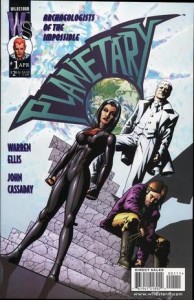 Archaeologists of our Collective Cultural Imagination
Archaeologists of our Collective Cultural Imagination
It’s often said that one measure of literature (and something similar can be said of other art forms) is whether it rewards re-reading or not. After finishing the graphic novel series Planetary, I immediately went back to the beginning and re-read the entire story. This re-read was a matter of both desire and necessity: Planetary is that kind of a story, loaded with puzzle pieces whose juxtapositions aren’t fully clear until the end. I’m happy to report that the second reading was more rewarding and more rousing than the first, which in and of itself is a hell of a compliment.
Planetary follows the adventures of a super-team of persons with uncanny powers who, rather than fighting villainy day after day, direct their efforts toward unearthing the rare, or even the impossible. As the story progresses, though, villainy does rear its villainous head, in forms that invoke wry double-takes of realization for fans of culture of every sort. In its homages to pop-cultural and literary characters, Planetary owes a lot to Alan Moore’s League of Extraordinary Gentlemen series (StoryThoughts on the League coming soon), but Ellis and Cassaday undeniably claim their own ground here, especially in the story’s tone: though Planetary hits more than its share of funny notes and wry realizations, it doesn’t shy away from the heavier, more serious end of the keyboard either. As the team’s seemingly random series of explorations and excavations go on, patterns begin to form, cause and effect begin to come clear, and we realize that, in fact, the stakes couldn’t be higher.
In its borrowing of literary and comics artifacts, Planetary performs the double trick of both rooting these co-opted stories and characters more deeply in reality and making them even more fantastical. The team’s sojourn on a disputed island north of Japan, for instance, gives simultaneous nods to beloved childhood popcorn movies and to Yukio Mishima, among the most controversial, provocative, and mentally unstable writers of the 20th century (the last of which is saying a lot). In learning the fine art of investigation, protagonist Elijah Snow encounters [NON-SPOILER RESULTING IN MADDENING OBSCURITY ALERT] a personage of very recognizable name in the field, who’s now in league with a well-known figure from another literary genre – a very odd couple, but once we’ve begun to feel at home in Planetary’s world the pairing seems almost inevitable.
Comics often have an on-again off-again relationship with science, and especially physics. To paraphrase The Big Bang Theory’s Sheldon Cooper, when Superman swoops in to catch Lois Lane after she’s already plummeted 30 stories, his Arms of Steel suddenly arresting her fall would do even deadlier work than pavement, slicing her neatly into three pieces on impact. Planetary has no pretensions of being so-called “hard” sci-fi – it’s a superhero story with ghosts in it, all right? – but Ellis and Cassaday earn considerable scientific cred in their approach to many-dimensional space-time, at least to the degree that this particular creative writing major understands such things.
As the Planetary archeologists unearth not-so-ancient relic after relic, story after story, we also have the pleasure of seeing the archeologists themselves unearthed; in some cases, we learn surprising truths about who they are and where their roots are buried at the same time as they’re learning these things. What’s more, we have the pleasure of recognizing that our own selves and our own understanding of the world grow, at least in part, from the same roots, the same stories.
